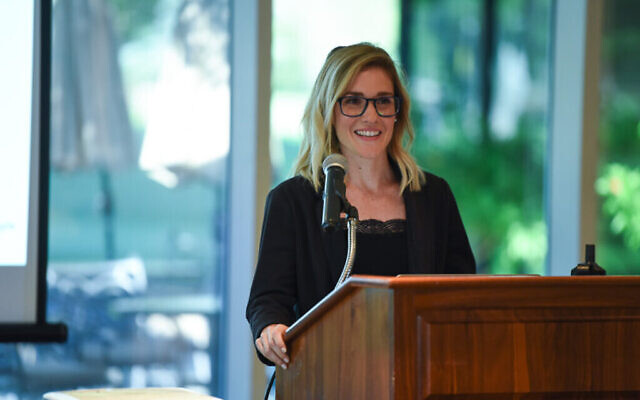More than one in three Jews targeted with antisemitism
88 per cent of American Jewish adults believe antisemitism is a problem.
THERE are seven factors that help explain a recent surge in antisemitism in the United States, according to Holly Huffnagle, the American Jewish Committee’s (AJC’s) US director for combatting antisemitism.
A recent survey conducted by the AJC on attitudes to antisemitism found that 88 per cent of American Jewish adults believe antisemitism is a problem in the US, compared to 63 per cent of the general public. More than one in three US Jews surveyed said they had been the targets of antisemitism in the past five years.
FBI figures showed that 60.2 per cent of all religious bias crimes in the US target Jews, up from 56.9 per cent in 2018, even though Jews are less than 2 per cent of the population.
The factors explaining this rise, Huffnagle said, are economic uncertainty; a lack of confidence in democracy; increased emphasis in society on race and national identity; the fading legacy of the Holocaust, with a US survey showing 11 per cent of youth think Jews caused it; a deepening polarisation between the right and the left over the Israeli/Palestinian conflict; the rise in the use of the internet and social media; and the growing number of sources of antisemitism and the growing complexity of it, with recent US antisemitism fringe religious extremists the Black Israelites, from the left and from COVID-19 protests.
Huffnagle, the guest speaker at the Australia/Israel & Jewish Affairs Council’s (AIJAC’s) final webinar for 2020, emphasised the importance of there being a national approach to combating antisemitism, as it should be an issue for everyone.
She emphasised that antisemitism doesn’t just come from the far right. There is a long history of antisemitism from the left, but there is a lack of awareness about that because “they advocate from the platform of anti-racism, but somehow they let every other minority define the persecution against them except Jews.” She added that there is also Islamist antisemitism.
On the working definition of antisemitism from the International Holocaust Remembrance Alliance (IHRA), she said there is now the need for a definition, because “in the early 2000s, Jews were starting to be attacked as ‘agents of Israel’ or Jewish sites were being vandalised but it was called ‘political actions,’ or ‘anti-Israel actions’, there were some protests where people shouted, ‘slaughter the Jews,’ and it was called, ‘inter-communal tensions’…synagogues were firebombed…in Europe…for the actions of a nation state, Israel, and it was not called antisemitism.”
Therefore, she explained, a definition was needed to bring in examples in context. Even denying the Jewish right to self-determination was not considered antisemitism.
She continued, “The critics on the left are saying this is a Jewish definition, that it’s a tool of the Israeli government, that it’s an Israeli government definition, and that was not the case.
“It was created by an apolitical body of experts, of policy-makers, and the IHRA is a non-Jewish body. It’s an intergovernmental body of at the time 31 member states that adopted it in 2016, and most of the governments in Europe and around the world that are using it and have adopted it, they aren’t Jewish.”
There is a need to bring in more governments to adopt the IHRA definition, she said, noting that the governments of countries such as Sweden and Spain, which are further left than the US Democratic Party, and less friendly to Israel, have adopted it.


comments